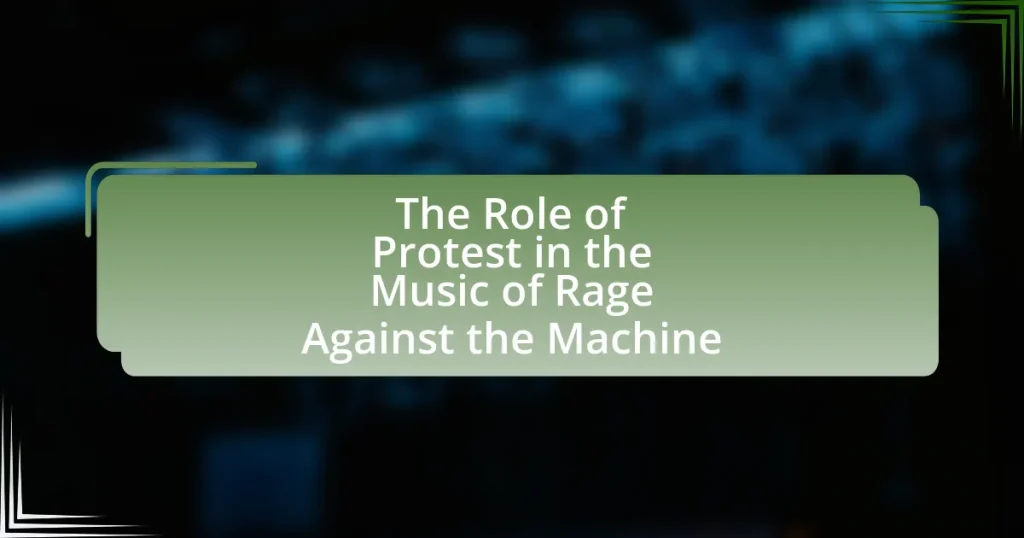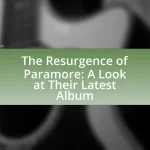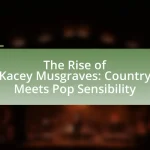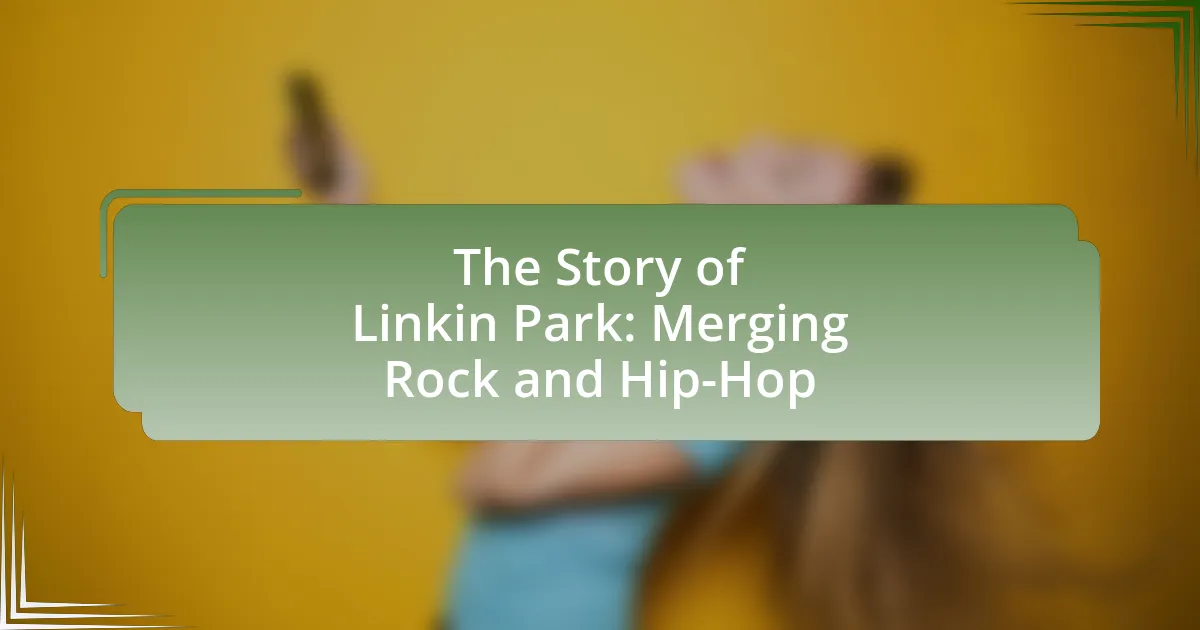Rage Against the Machine is a prominent band known for its protest music that addresses social injustices, political corruption, and systemic oppression. Their lyrics often critique capitalism, imperialism, and government actions, with notable songs like “Killing in the Name” highlighting issues such as police brutality and institutional racism. The article explores how the band’s music serves as a rallying cry for activism, the significance of protest themes in their lyrics, and the impact of their aggressive musical style on listeners. Additionally, it examines the evolution of their protest music over time, the influence of historical events, and the broader implications of their work in inspiring social change and activism.
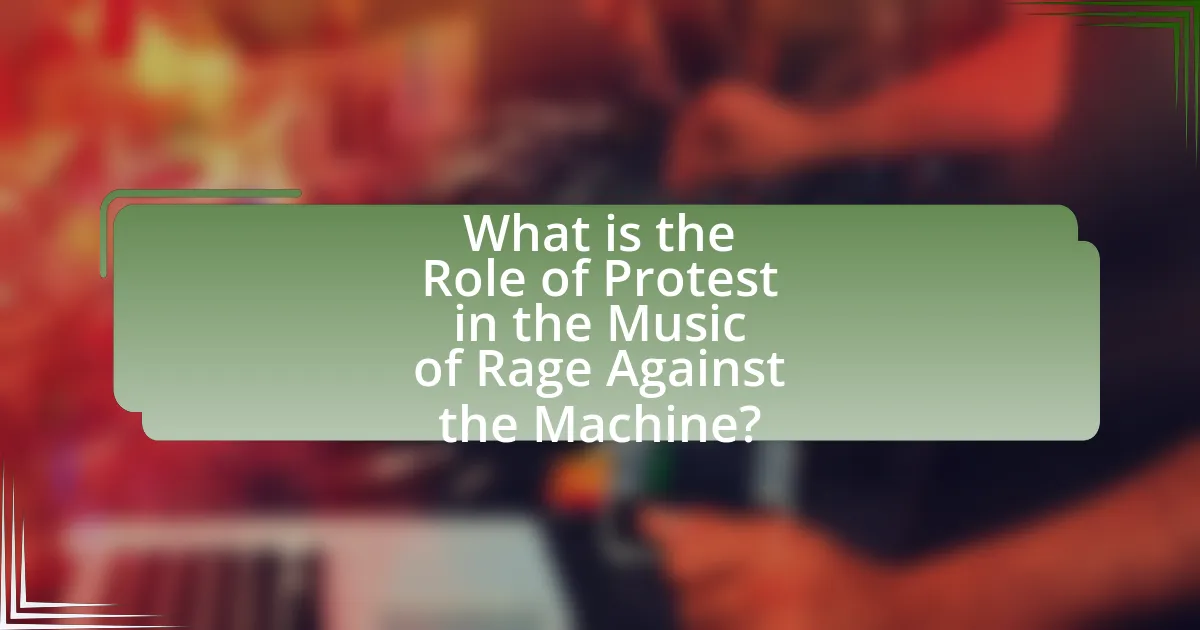
What is the Role of Protest in the Music of Rage Against the Machine?
The role of protest in the music of Rage Against the Machine is central, as their lyrics and themes explicitly address social injustices, political corruption, and systemic oppression. The band’s songs often incorporate historical references and critiques of capitalism, imperialism, and government actions, exemplified in tracks like “Killing in the Name,” which challenges institutional racism and police brutality. Their music serves as a rallying cry for activism, encouraging listeners to question authority and engage in social change, as evidenced by their participation in various protests and advocacy for causes such as labor rights and anti-globalization movements.
How does Rage Against the Machine incorporate protest themes in their lyrics?
Rage Against the Machine incorporates protest themes in their lyrics by addressing social injustices, political corruption, and systemic oppression. The band’s lyrics often reference historical events, such as the Zapatista uprising in Mexico and the struggles against capitalism and imperialism, highlighting their commitment to activism. For example, in songs like “Killing in the Name,” they critique police brutality and institutional racism, using powerful imagery and direct language to provoke thought and inspire action. Their incorporation of these themes is further validated by their consistent engagement in political activism, including participation in protests and support for various social movements, reinforcing their message of resistance against oppression.
What specific social and political issues do their songs address?
Rage Against the Machine’s songs address specific social and political issues such as systemic racism, economic inequality, government oppression, and anti-capitalism. For instance, their song “Killing in the Name” critiques police brutality and institutional racism, highlighting the violent history of law enforcement against marginalized communities. Additionally, “Bulls on Parade” discusses the military-industrial complex and the exploitation of resources, emphasizing the connection between capitalism and war. Their lyrics often reflect a deep discontent with social injustices, advocating for revolutionary change and awareness of these pressing issues.
How do the band’s lyrics reflect their stance on capitalism and government?
Rage Against the Machine’s lyrics explicitly critique capitalism and government by highlighting themes of social injustice, economic inequality, and anti-authoritarianism. The band employs powerful imagery and direct language to convey their opposition to corporate greed and systemic oppression, as seen in songs like “Killing in the Name,” which denounces police brutality and institutional racism. Their lyrics often reference historical events and figures, such as the Zapatista uprising in Mexico, illustrating their stance against neoliberal policies and imperialism. This approach not only reflects their discontent with the status quo but also serves as a rallying cry for listeners to challenge oppressive systems.
Why is protest music significant in the context of Rage Against the Machine?
Protest music is significant in the context of Rage Against the Machine because it serves as a powerful vehicle for political expression and social critique. The band’s lyrics often address issues such as systemic injustice, corporate greed, and government oppression, exemplified in songs like “Killing in the Name” and “Bulls on Parade.” These tracks not only resonate with listeners but also inspire activism and awareness, reflecting the band’s commitment to challenging the status quo. Rage Against the Machine’s fusion of rock and rap amplifies their message, making it accessible to a diverse audience and reinforcing the impact of their protest music on cultural and political discourse.
What impact does protest music have on listeners and society?
Protest music significantly influences listeners and society by raising awareness of social issues and inspiring collective action. This genre often serves as a catalyst for political engagement, encouraging individuals to question authority and mobilize for change. For instance, songs like “Killing in the Name” by Rage Against the Machine have been linked to increased activism and discussions around systemic injustice, particularly in the context of police brutality and racial inequality. Research indicates that protest music can enhance emotional responses, fostering a sense of solidarity among listeners, which is crucial for social movements. The impact of protest music is evident in its ability to shape public discourse and motivate grassroots organizing, as seen during various historical movements, including the Civil Rights Movement and anti-war protests.
How does Rage Against the Machine’s music inspire activism?
Rage Against the Machine’s music inspires activism by combining powerful lyrics with aggressive instrumentation to address social and political injustices. Their songs often critique capitalism, government oppression, and systemic racism, motivating listeners to engage in social change. For instance, tracks like “Killing in the Name” explicitly challenge police brutality and institutional racism, encouraging fans to question authority and take action. The band’s commitment to activism is further evidenced by their participation in protests and support for various social movements, amplifying their message and fostering a sense of urgency among their audience.
What musical elements enhance the protest message in their songs?
Rage Against the Machine enhances the protest message in their songs through aggressive guitar riffs, dynamic rhythms, and powerful vocal delivery. The heavy use of distorted guitar creates a sense of urgency and rebellion, exemplified in tracks like “Killing in the Name,” where the riff serves as a sonic representation of defiance against authority. Additionally, the band’s incorporation of varied tempos and time signatures adds complexity to their music, reflecting the chaotic nature of social unrest. The passionate and often confrontational vocal style of Zack de la Rocha further amplifies the lyrical content, making the protest themes more impactful. This combination of musical elements effectively conveys the band’s anti-establishment sentiments and resonates with listeners, reinforcing the urgency of their message.
How do instrumentation and vocal delivery contribute to the protest themes?
Instrumentation and vocal delivery significantly enhance the protest themes in Rage Against the Machine’s music by creating an intense emotional atmosphere and delivering powerful messages. The band’s use of heavy guitar riffs, aggressive drumming, and dynamic bass lines establishes a sense of urgency and rebellion, which aligns with the themes of social justice and anti-establishment sentiments. For instance, the song “Killing in the Name” features a relentless guitar distortion that amplifies the anger and frustration directed at systemic racism and police brutality.
Moreover, the vocal delivery by Zack de la Rocha employs a mix of shouting and rhythmic speech, which conveys passion and conviction, making the lyrics more impactful. His delivery style often includes call-and-response elements that engage listeners and encourage collective action, reinforcing the protest message. The combination of these musical elements not only captures attention but also motivates listeners to reflect on and respond to the issues presented, exemplifying how instrumentation and vocal delivery are integral to the protest themes in their music.
What role does genre play in conveying their message?
Genre plays a crucial role in conveying the message of Rage Against the Machine by providing a distinct musical framework that amplifies their political and social critiques. The band’s fusion of rock, rap, and punk creates an aggressive sound that mirrors the urgency of their messages, making them more impactful. For instance, the use of heavy guitar riffs and rhythmic vocal delivery enhances the emotional intensity of their lyrics, which often address issues like systemic injustice and corporate greed. This genre-blending approach not only attracts a diverse audience but also allows for a more dynamic expression of protest, as seen in songs like “Killing in the Name,” where the combination of genres underscores the themes of rebellion and resistance.
How has Rage Against the Machine’s protest music evolved over time?
Rage Against the Machine’s protest music has evolved from a focus on anti-establishment themes in the 1990s to a broader critique of systemic issues in contemporary society. Initially, their self-titled debut album in 1992 emphasized direct political messages against capitalism and government oppression, exemplified by tracks like “Killing in the Name.” Over time, their music incorporated a wider range of social justice issues, including racial inequality and environmental concerns, as seen in their later works like “The Battle of Los Angeles” in 2003. This evolution reflects a response to changing political landscapes and the increasing complexity of global issues, demonstrating their adaptability and commitment to activism through music.
What historical events influenced the band’s music and message?
Rage Against the Machine’s music and message were significantly influenced by historical events such as the Vietnam War, the civil rights movement, and the rise of neoliberalism in the late 20th century. The Vietnam War, which sparked widespread protests and anti-establishment sentiments, shaped the band’s anti-war and anti-imperialist themes. The civil rights movement provided a framework for addressing systemic racism and social injustice, which is evident in their lyrics advocating for marginalized communities. Additionally, the economic policies of neoliberalism, particularly during the 1980s and 1990s, fueled their critiques of corporate greed and government complicity in social inequality. These events collectively informed the band’s revolutionary ethos and commitment to activism, as reflected in their powerful and politically charged music.
How did the political climate of the 1990s shape their early work?
The political climate of the 1990s significantly influenced the early work of Rage Against the Machine by fostering a sense of urgency and activism in their music. The rise of neoliberal policies, the end of the Cold War, and increasing social inequalities prompted the band to address issues such as corporate greed, government oppression, and systemic injustice. For instance, the band’s self-titled debut album, released in 1992, featured tracks like “Killing in the Name,” which directly criticized police brutality and institutional racism, reflecting the widespread discontent and protests of the era. This alignment with the political zeitgeist not only shaped their lyrical content but also established them as a voice for the disenfranchised, resonating with audiences who were increasingly aware of social and political issues during that decade.
What recent events have prompted new protest songs from the band?
Recent events such as the rise of social justice movements, including Black Lives Matter protests and the ongoing debates surrounding climate change, have prompted new protest songs from Rage Against the Machine. The band’s engagement with these issues reflects their historical commitment to addressing systemic inequality and political corruption, as evidenced by their previous works that tackled similar themes. The resurgence of activism in response to police brutality and environmental crises has inspired the band to create music that resonates with contemporary struggles for justice and equality.
How do the band’s collaborations and live performances amplify their protest message?
The band’s collaborations and live performances amplify their protest message by creating a powerful platform for social and political activism. Collaborations with artists from diverse genres, such as hip-hop and punk, enhance the reach and impact of their message, as seen in their work with artists like Chuck D and KRS-One, which merges different audiences and perspectives. Live performances serve as a direct engagement tool, where the band’s energetic and confrontational style, combined with visual elements like banners and speeches, fosters a sense of urgency and collective action among attendees. For instance, during their 1999 performance at the Democratic National Convention, they used the stage to criticize political corruption, effectively turning the concert into a rally for change. This combination of collaborative efforts and dynamic live shows not only reinforces their protest themes but also mobilizes fans to participate in activism beyond the music.
What notable collaborations have enhanced their protest themes?
Rage Against the Machine’s protest themes have been notably enhanced through collaborations with artists such as Public Enemy and Wu-Tang Clan. These collaborations have fused genres and amplified messages of social justice and resistance. For instance, the song “Renegades of Funk,” which features elements from Afrika Bambaataa’s work, showcases a blend of hip-hop and rock, reinforcing themes of rebellion against systemic oppression. Additionally, their collaboration with artists like Zack de la Rocha on various projects has further solidified their stance on political activism, making their music a powerful vehicle for protest.
How do live performances serve as a platform for activism?
Live performances serve as a platform for activism by providing a direct and engaging space for artists to communicate social and political messages to their audience. Rage Against the Machine exemplifies this by using their concerts to address issues such as corporate greed, government oppression, and social injustice, often incorporating speeches, visuals, and calls to action into their performances. For instance, during their shows, they have displayed banners and used their music to raise awareness about various causes, effectively mobilizing fans to participate in activism. This approach not only amplifies the message but also fosters a sense of community and urgency among attendees, encouraging them to take action beyond the concert setting.
What are the broader implications of Rage Against the Machine’s protest music?
Rage Against the Machine’s protest music has significant implications for social activism and political discourse. Their lyrics challenge systemic injustices, encouraging listeners to question authority and engage in activism. For instance, songs like “Killing in the Name” confront police brutality and institutional racism, resonating with movements such as Black Lives Matter. This connection illustrates how their music serves as a catalyst for social change, inspiring generations to advocate for equality and justice. Additionally, their fusion of rock and hip-hop broadens the appeal of protest music, making it accessible to diverse audiences and fostering a collective consciousness around social issues.
How does their music influence other artists and genres?
Rage Against the Machine’s music significantly influences other artists and genres by integrating political themes with aggressive rock and hip-hop elements. Their fusion of rap and rock has inspired a wave of nu-metal bands, such as Linkin Park and Korn, who adopted similar stylistic blends. Additionally, their politically charged lyrics have encouraged artists across genres, including hip-hop and punk, to address social issues, as seen in the works of artists like Public Enemy and Anti-Flag. The band’s impact is evident in the way contemporary musicians incorporate activism into their music, reflecting Rage Against the Machine’s legacy of using art as a platform for protest.
What legacy has Rage Against the Machine left in the realm of protest music?
Rage Against the Machine has left a profound legacy in protest music by merging aggressive rock with politically charged lyrics that address social injustices and systemic oppression. Their self-titled debut album, released in 1992, featured tracks like “Killing in the Name,” which critiques institutional racism and police brutality, resonating with audiences and inspiring activism. The band’s use of music as a platform for political discourse has influenced countless artists and movements, establishing a template for how music can serve as a vehicle for social change. Their commitment to activism, including participation in protests and support for various causes, further solidified their role as a voice for the marginalized, making them a cornerstone of modern protest music.
How do contemporary artists draw inspiration from their work?
Contemporary artists draw inspiration from their work by reflecting on personal experiences, societal issues, and historical contexts. For instance, artists often engage with themes of social justice, as seen in the music of Rage Against the Machine, which addresses political and economic inequalities. This connection to real-world issues allows artists to create meaningful expressions that resonate with audiences, demonstrating the impact of their work on both personal and collective levels.
What can listeners learn from Rage Against the Machine’s approach to protest music?
Listeners can learn the importance of combining musical artistry with political activism from Rage Against the Machine’s approach to protest music. The band effectively uses aggressive sound and powerful lyrics to address social injustices, such as systemic racism and economic inequality. For instance, their song “Killing in the Name” critiques police brutality and institutional racism, making a strong statement that resonates with listeners. This blend of music and message demonstrates how art can serve as a catalyst for social change, encouraging audiences to engage critically with political issues and consider their own roles in activism.
How can individuals engage with social issues through music?
Individuals can engage with social issues through music by using it as a platform for expression and activism. Music serves as a powerful medium to raise awareness, inspire action, and foster community around social issues. For instance, Rage Against the Machine’s lyrics often address themes of political injustice, economic inequality, and systemic oppression, effectively mobilizing listeners to reflect on and challenge societal norms. Historical examples include the civil rights movement, where artists like Bob Dylan and Nina Simone used their music to highlight racial injustices, demonstrating that music can galvanize public sentiment and drive social change.
What are effective ways to support causes highlighted in their songs?
Effective ways to support causes highlighted in songs include raising awareness through social media campaigns, attending live performances, and purchasing merchandise that benefits the cause. Social media platforms enable fans to share messages and information about the causes, amplifying their reach. Attending concerts not only shows support but also often contributes to fundraising efforts for specific issues. Additionally, buying merchandise directly linked to a cause can provide financial support, as seen with Rage Against the Machine, where proceeds from certain items have historically gone to various activist organizations.
